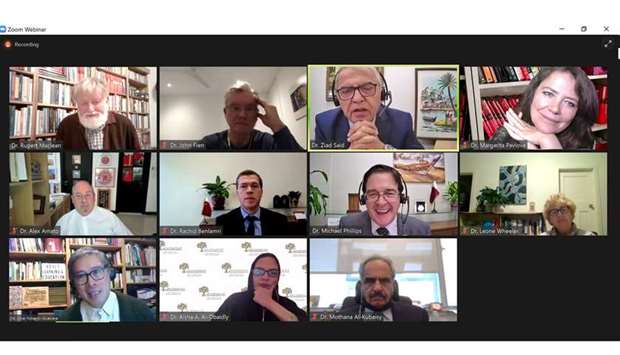College of the North Atlantic - Qatar (CNA-Q) has hosted a webinar titled Improving and Enriching the Human Capital of Qatar through the Identification and Development of 21st Century Skills for Sustainability and Employability'.
During the webinar, the college aimed to share the findings of a unique study funded by Qatar National Research Fund (QNRF) and led by Dr Ziad Said - Applied Research and Innovation at CNA-Q, in collaboration with Qatar University (QU), Royal Melbourne Institute of Technology University, Hong Kong Institute of Education, Qatar Green Building Council and entities from the public and private sectors.
The webinar saw the participation of Dr Darwish Abdulrahman al-Emadi, chief adviser to the president - QU; professor Rupert Maclean, former Unesco chair on TVET and Sustainable Development - Qatar and Hong Kong; Dr Houda Aouadi, senior education consultant – Unesco; Dr Aisha al-Obaidaly, director of Capacity Building at QNRF; Dr Margarita Pavlova, director of the UNEVOC Centre Hong Kong, and professors from across the globe.
As the Institution of Excellence in Technical and Vocational Education and Training in Qatar, College of the North Atlantic "has been relentlessly working on research and innovative programmes that strengthen TVET learning, policy and practice.
The '21st Century Skills for Sustainability and Employability' study is a unique project in Qatar, shedding light on human capital and sustainable development by observing and exploring three main sectors: oil & gas, built environment and finance", CNA-Q said in a statement.
Dr Mothana al-Kubaisy, director of Institutional Excellence at CNA-Q, said: “We continuously aim to launch projects that facilitate the knowledge and technology transfer developed at CNA-Q to guarantee student employability and success. Among these projects is the study of 21st century skills, which reflects a deep observation of our economy’s core. Today, we celebrate the progress and the results of a one of a kind study in Qatar that will culminate in potential policies, strategies and guidelines that can serve our country across different sectors.”
This research will contribute to new thinking in human capital as it explores the types of skills needed in rapidly changing economies. These skills have been classified under four categories: cognitive skills, social skills, technological skills and civic skills.
Dr Michael Phillips, academic manager of Applied Research and Innovation Centre at CNA-Q, noted: “While interpreting our conclusions, we discovered a need for skills that go beyond technical requirements. Today's employers prize new hires with interdisciplinary skills. They look for graduates that innovate and drive progress and tangible growth once they enter the professional sphere.”
Dr Said added, “Our webinar aims to initiate a process of change, an approach that will bridge the gap between the market requirements and the curricula’s development, in our drive towards achieving a knowledge–based economy as stated in Qatar National Vision 2030.”
Dr al-Obaidaly noted, “Equipping students with 21st century skills and knowledge is undoubtedly an important topic. It is also a clear testimony to QNRF’s commitment for comparatively funding projects in all fields of sciences as clearly outlined in the Qatar Research, Development and Innovation Strategy (QRDI 2030).
"QNRF supports strong collaboration between researchers in academia and policymakers in the country. To this end, we expect the findings of this project to be shared and presented to the relevant government entities.”
The webinar saw the participation of Dr Darwish Abdulrahman al-Emadi, chief adviser to the president - QU; professor Rupert Maclean, former Unesco chair on TVET and Sustainable Development - Qatar and Hong Kong; Dr Houda Aouadi, senior education consultant – Unesco; Dr Aisha al-Obaidaly, director of Capacity Building at QNRF; Dr Margarita Pavlova, director of the UNEVOC Centre Hong Kong, and professors from across the globe.
As the Institution of Excellence in Technical and Vocational Education and Training in Qatar, College of the North Atlantic "has been relentlessly working on research and innovative programmes that strengthen TVET learning, policy and practice.
The '21st Century Skills for Sustainability and Employability' study is a unique project in Qatar, shedding light on human capital and sustainable development by observing and exploring three main sectors: oil & gas, built environment and finance", CNA-Q said in a statement.
Dr Mothana al-Kubaisy, director of Institutional Excellence at CNA-Q, said: “We continuously aim to launch projects that facilitate the knowledge and technology transfer developed at CNA-Q to guarantee student employability and success. Among these projects is the study of 21st century skills, which reflects a deep observation of our economy’s core. Today, we celebrate the progress and the results of a one of a kind study in Qatar that will culminate in potential policies, strategies and guidelines that can serve our country across different sectors.”
This research will contribute to new thinking in human capital as it explores the types of skills needed in rapidly changing economies. These skills have been classified under four categories: cognitive skills, social skills, technological skills and civic skills.
Dr Michael Phillips, academic manager of Applied Research and Innovation Centre at CNA-Q, noted: “While interpreting our conclusions, we discovered a need for skills that go beyond technical requirements. Today's employers prize new hires with interdisciplinary skills. They look for graduates that innovate and drive progress and tangible growth once they enter the professional sphere.”
Dr Said added, “Our webinar aims to initiate a process of change, an approach that will bridge the gap between the market requirements and the curricula’s development, in our drive towards achieving a knowledge–based economy as stated in Qatar National Vision 2030.”
Dr al-Obaidaly noted, “Equipping students with 21st century skills and knowledge is undoubtedly an important topic. It is also a clear testimony to QNRF’s commitment for comparatively funding projects in all fields of sciences as clearly outlined in the Qatar Research, Development and Innovation Strategy (QRDI 2030).
"QNRF supports strong collaboration between researchers in academia and policymakers in the country. To this end, we expect the findings of this project to be shared and presented to the relevant government entities.”

